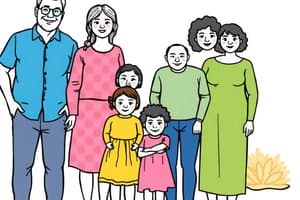Podcast
Questions and Answers
What are some ways in which family members provide support?
What are some ways in which family members provide support?
Emotional, practical, and financial support
How does family contribute to our sense of self and cultural heritage?
How does family contribute to our sense of self and cultural heritage?
Family helps shape our sense of self and cultural heritage
In what ways do family relationships contribute to our health and well-being?
In what ways do family relationships contribute to our health and well-being?
Contribute to our overall health, mental well-being, and longevity
Why is setting healthy boundaries important in nurturing family relationships?
Why is setting healthy boundaries important in nurturing family relationships?
What are some changes families may need to adapt to?
What are some changes families may need to adapt to?
What is a traditional nuclear family?
What is a traditional nuclear family?
What are blended families?
What are blended families?
Define extended family.
Define extended family.
Describe single-parent families.
Describe single-parent families.
What are non-traditional families?
What are non-traditional families?
Flashcards are hidden until you start studying
Study Notes
Unpacking the Complexity of Family
From the moment we're born, family shapes our lives in countless ways. In this exploration, we'll delve into the intricacies of family, examining its diverse forms, the roles it plays in our lives, and the challenges it presents.
Defining Family
Family is often associated with a group of people related by blood or marriage. However, the concept of family extends far beyond this traditional definition, encompassing various forms of kinship and living arrangements. Factors such as shared interests, emotional ties, and mutual support can create an expansive definition of family.
Types of Family
- Traditional Nuclear Family: A common narrative involving a married couple and their children.
- Extended Family: Includes grandparents, aunts, uncles, and cousins, who may live together or nearby.
- Blended Families: Resulting from second or subsequent marriages, these families involve step-relations and sometimes half-siblings.
- Single-Parent Families: Led by one parent, often due to divorce, death, or personal choice.
- Multi-generational Families: Families composed of three or more generations of the same family, often living under the same roof.
- Non-traditional Families: Families that deviate from the conventional nuclear family model, such as same-sex couples or individuals who choose to adopt or foster children.
Benefits of Family
- Social Support: Family members provide emotional, practical, and financial support.
- Identity: Family helps shape our sense of self and our cultural heritage.
- Health and Well-Being: Family relationships contribute to our overall health, mental well-being, and longevity.
- Confidence and Resilience: Family provides a stable foundation from which we can develop confidence and resilience.
Challenges within Family
- Conflict and Communication: Families can experience disagreements and misunderstandings, leading to tension and conflict.
- Boundaries and Boundaries: Setting and maintaining healthy boundaries is essential to nurturing healthy relationships within the family.
- Diversity: Families may struggle to navigate differences in culture, religion, and values.
- Change and Transition: Families must adapt to changes such as illness, death, divorce, or the transition to adulthood.
Conclusion
Family is a powerful force in our lives, influencing our identity, health, and well-being. As we navigate the diverse forms and challenges of family, it's essential to prioritize open communication, mutual support, and respect. By understanding the complexities of family, we can cultivate stronger relationships and healthier communities.
Studying That Suits You
Use AI to generate personalized quizzes and flashcards to suit your learning preferences.




